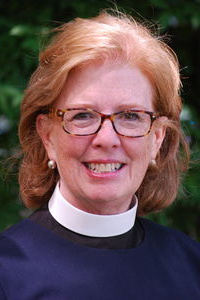

Photo courtesy of General Board of Church and Society.
I preached a sermon at the wedding of a young couple recently. She is Roman Catholic and he grew up United Methodist. She had been a student where I was her chaplain. Jane’s beloved roommate for all of her college years, Aysha, is Muslim, and had – in the same month – married the man of her dreams.
Jane and Aysha both sat on the Interreligious Council, which was made up of students representing 30 of the university’s recognized faith communities. No faith community was monolithic. No community ever is. There were four Jewish groups, four Muslim groups, 15 Christians, three Hindus, one Buddhist, one Sikh and one Jain. Every week there were many diverse and devout voices in the room.
Students represented their own traditions. They each represented themselves with the affinities as well as questions of conscience about their own traditions. Sometimes questions were shared. Occasionally a Roman Catholic would wonder aloud how the church could not ordain women. For some Orthodox Jews, why was it important to have men and women segregated for prayer? For some Muslims, why did women have to pray behind men? For evangelical Christians, how could mainline Protestants not follow more closely the “laws” set forth in the Bible as they believed them?
In addition to giving space for their own “faith family” discussions, these students were on a journey of discovery, understanding and respecting the faiths of those gathered at the Interreligious Council table. With only a couple of exceptions over 20+ years, no one ever crossed over from his or her tradition to that of another. Nearly all would attest to these relationships making their own faith stronger and their love for others deeper.
Being invited to preach at the wedding of this particular couple brought back lovely and vivid memories of the first day I met Jane and Aysha: two young, devout women — one from Indiana and the other from Missouri. These two were inseparable for all four years of their college careers. They came to know and love each other’s habits, prayers, families, dietary practices, religious observances, as well as normal young adult life.
And now they each have fallen in love with men who are becoming good husbands and companions, supporting Jane and Aysha as they continue their respective journeys in faith and love.
This journey of friendship gives us insight into what it takes to be good and loving neighbors. It is characterized by meeting, getting acquainted, apprehension, listening, worry, learning, delighting in experiences, sharing joys, arguing, teasing, supporting in sorrow, appreciating, respecting and loving.
******
Humans are capable of making promises to one another that can override incredible circumstances.(1) We are bold enough to assert that relationships can and will survive the conditions that befall every life: separations, losses, illnesses, tragedies, horrors, suffering, wars and death.
And this promising is a precarious undertaking. (2) There is the story of Jack. Jack is 6 years old. His friend Ann told Jack she really needed to talk with him about friendship. Some parents had heard that Ann had been going around saying that she wasn't friends with any of her old friends, including Jack, because she had made a new one.
A bit curious, Jack’s mom said to her friend, “Jack, in his usual fashion, had said nothing about this. He cares so much about some things and about things you would think he'd care quite a lot, he cares inexplicably very little. So today in the car on the way home, I asked whether anything had transpired with Ann and he said, ‘Well, she said we weren't friends any more, but then after a while we found each other's hearts again.’” We found each other’s heart again.
Loving our neighbors, like friendship and marriage, is a journey of finding each other’s heart again and again. Finding each other’s heart is the infinite mystery of love that creates, sustains and transforms you, and transforms the world.
Relationships — whether neighborly, in friendship or in marriage — will have and need companionship. Companionship of each other, of our families and with those who are fellow travelers striving to find each other’s hearts. From the beginning, God made us for Gods-self and for each other. The mystery of loving others increases our love for God. Is that not what faith is about?
The Rev. Susan Henry-Crowe is chief executive of the United Methodist Board of Church and Society.
1. Shea, John, The Spiritual Wisdom of the Gospels for Christian Preachers and Teachers, Liturgical Press, Collegeville, Minnesota, p.278.
2. Ibid.
"Many Voices, One Faith” is a forum for sharing theological perspectives on topics of interest in The United Methodist Church. The forum is designed to put the voices of the church in conversation with one another and build understanding of what it means to be United Methodist today. Read more commentaries.
Like what you're reading? Support the ministry of UM News! Your support ensures the latest denominational news, dynamic stories and informative articles will continue to connect our global community. Make a tax-deductible donation at ResourceUMC.org/GiveUMCom.



